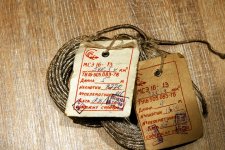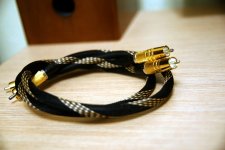This is a correct assumption.
URM70 is a very good performing cable, low capacitance, good shielding and flexible.
Thanks a lot for your kind and valuable reply
I see that comes both with solid and stranded inner core
Any preference about one of the two ?
I use RG316 now though, as being PTFE it doesn't mess up when you solder it
I think that i tried this one. I remember a very stiff cable.
As you say i love PTFE as well. It is extremely beneficial while soldering
Other coaxial with PE insulation are a night mare for me ...
I think that i will try again the RG316 with good RCA connectors
Thanks again.
Regards, gino
Last edited:
URM70 should have stranded inner, that's its specification. Solid core cable is too stiff for interconnects and could fatigue with repeated use.
RG316 is not stiff, it's quite thin and again with stranded core.
Neutrik and Amphenol make good RCA connectors
Thanks a lot. I understand that the cable i have used was different RG model.
Yes stiffness is not handy at all. But someone swear about the superior signal transfer with solid core ... i am completely ignorant on this by the way.
If you say that stranded one is ok i trust you.
Thanks again and kind regards,
gino
For which connection?
There's a lot of cables in my system.
Hi yes you are right
I am mostly interested in analogue cables terminated with RCAs
There are big discussions going on among audiophiles but i have never been able to get some specific explanation about why cheap coaxial should not be perfectly ok.
I understand that construction quality is variable, but a decently made coaxial should be quite ok also for analogue signals transfer i guess.
And i have already received valuable confirmations.
Thanks and regards,
gino
Stranded is OK.
The cable is rated to RF use, any skin effect is way above the frequencies of audio.
Try it and see. You won't have any problems.
There is a danger threads like these descend into arguments.
Hi and thanks again.
For me the issue is closed. I will make some out of the cables you mention.
Thanks and regards,
gino
After experimentation I ended up using self-made cables from Cat 5+ network cable. Paying more is justified only for something that's made of clearly better metal - that's by my standards.
Loudspeakr cables are braided from 3 cat-cables and interconnects just twirled from two cat-wires. And cat is solid-core type.
Loudspeakr cables are braided from 3 cat-cables and interconnects just twirled from two cat-wires. And cat is solid-core type.
Tongue in cheek and deadly serious:
Copper
Works for every other electrical duty.
Hi thanks and agreed
Silver is too expensive even if someone praise it.
Good quality copper is fine
Thanks and regards, gino
Gino, for RCA, I use a mix, depending on what was cheap, available, and had good connectors.
Thanks a lot. Actually connectors are usually a weak part in cheap cables.
And i like the use of teflon as insulator. It helps during soldering.
I have some fancy cables (ie, expensive) that someone gave me, but the shielding is not as good as the generics, so they have gotten little use
So also quality of construction is important. Selecting a common good Brand can be the solution (i.e. like Belden, Canare, Mogami etc.)
Thanks a lot
Regards, gino
After experimentation I ended up using self-made cables from Cat 5+ network cable. Paying more is justified only for something that's made of clearly better metal - that's by my standards.
Loudspeakr cables are braided from 3 cat-cables and interconnects just twirled from two cat-wires.
And cat is solid-core type
Thanks for the valuable suggestion. So no shield needed ?
I would like to stay with coaxial. They look to me a quite solid design.
The fact that they are designer for demanding applications should be a guarantee of good performance also with analogue.
I guess. Thanks and regards, gino
Canare Star-Quad
Superb engineering in this cable.
TecNec Premium Canare RCA Male to RCA Male Audio Cables RCA to RCA Cables at Markertek.com
Superb engineering in this cable.
TecNec Premium Canare RCA Male to RCA Male Audio Cables RCA to RCA Cables at Markertek.com
I use a DIY cables on the basis of Russian silver plated screened wire (3 inner silver plated wires + silver plated screen + fire proof insulation between) and various connectors and decorative mesh mostly from ebay.
attached pictures of wire and my diy cable
attached pictures of wire and my diy cable
Attachments
Speaker cable: Belden twisted pair, in 16 and 12 Ga. CL-2 rated. I happen to get it from Blue Jean. Twisted and tinned ends.
Analog RCA's DIY, Belden stranded 75 Ohm or Belden mic cable. Very flex able and made to length. A foot long cable is less likely to pick up noise that a three foot cable.
Digital RCS, plain old RF coax. (copper, not plated)
Fiber, any old TOSLINK. Length most important.
HNMI's only use Blue Jean cables. I run a 45 foot and a 50 foot with no issues. I started using them when I first tried a generic 50 foot S cable with obvious resolution issues. Bought theirs, and the test DVD looked fine. My test BD shows no issues with my shorter (1 foot) cables I got from Parts Express.
I bought a role of rip-off Monster cable years ago, but the crap insulation caused them to oxidize their entire length. Only the last links to my surrounds are left to replace. They ooze green out the ends.
My most difficult and sensitive cable issue is my IR repeater from my guest room to the bay. I would up with 14 Ga power cord and had to terminate far end. I could do better now, but that is in the wall works, so I leave it alone. ( Yes, IR are RF frequencies, square waves, and yes, the power cord IS a transmission line and it does require termination in this application.)
I use generic power cords I have a pile of. I hate IEC ends and when I get a chance, I remove the socket and replace it with a strain relief so I can connect the cord internally. I am not too picky here, but I did have a Chinese cord ( UL and CSA tag in place) where the terminals were not welded, but just wrapped around the terminals and molded. I prefer cords from old HP test equipment as they are twisted, rubber jacket so flexible. I cut to length.
I have tried various other cables before I understood the physics. Some were different, basically screwing things up. I know there may be other manufactures, but I only trust Belden cable made in the US. No silver, no cryogenic, no mono-crystal, no magic dialectic. No BS. I spend my money on things that matter.
Analog RCA's DIY, Belden stranded 75 Ohm or Belden mic cable. Very flex able and made to length. A foot long cable is less likely to pick up noise that a three foot cable.
Digital RCS, plain old RF coax. (copper, not plated)
Fiber, any old TOSLINK. Length most important.
HNMI's only use Blue Jean cables. I run a 45 foot and a 50 foot with no issues. I started using them when I first tried a generic 50 foot S cable with obvious resolution issues. Bought theirs, and the test DVD looked fine. My test BD shows no issues with my shorter (1 foot) cables I got from Parts Express.
I bought a role of rip-off Monster cable years ago, but the crap insulation caused them to oxidize their entire length. Only the last links to my surrounds are left to replace. They ooze green out the ends.
My most difficult and sensitive cable issue is my IR repeater from my guest room to the bay. I would up with 14 Ga power cord and had to terminate far end. I could do better now, but that is in the wall works, so I leave it alone. ( Yes, IR are RF frequencies, square waves, and yes, the power cord IS a transmission line and it does require termination in this application.)
I use generic power cords I have a pile of. I hate IEC ends and when I get a chance, I remove the socket and replace it with a strain relief so I can connect the cord internally. I am not too picky here, but I did have a Chinese cord ( UL and CSA tag in place) where the terminals were not welded, but just wrapped around the terminals and molded. I prefer cords from old HP test equipment as they are twisted, rubber jacket so flexible. I cut to length.
I have tried various other cables before I understood the physics. Some were different, basically screwing things up. I know there may be other manufactures, but I only trust Belden cable made in the US. No silver, no cryogenic, no mono-crystal, no magic dialectic. No BS. I spend my money on things that matter.
After experimentation I ended up using self-made cables from Cat 5+ network cable. Paying more is justified only for something that's made of clearly better metal - that's by my standards.
Loudspeakr cables are braided from 3 cat-cables and interconnects just twirled from two cat-wires. And cat is solid-core type.
Careful, high C speaker cables can cause amplifier instability and let the magic smoke out.
- Status
- This old topic is closed. If you want to reopen this topic, contact a moderator using the "Report Post" button.
- Home
- Member Areas
- The Lounge
- A curiosity - what cables do you use ?

